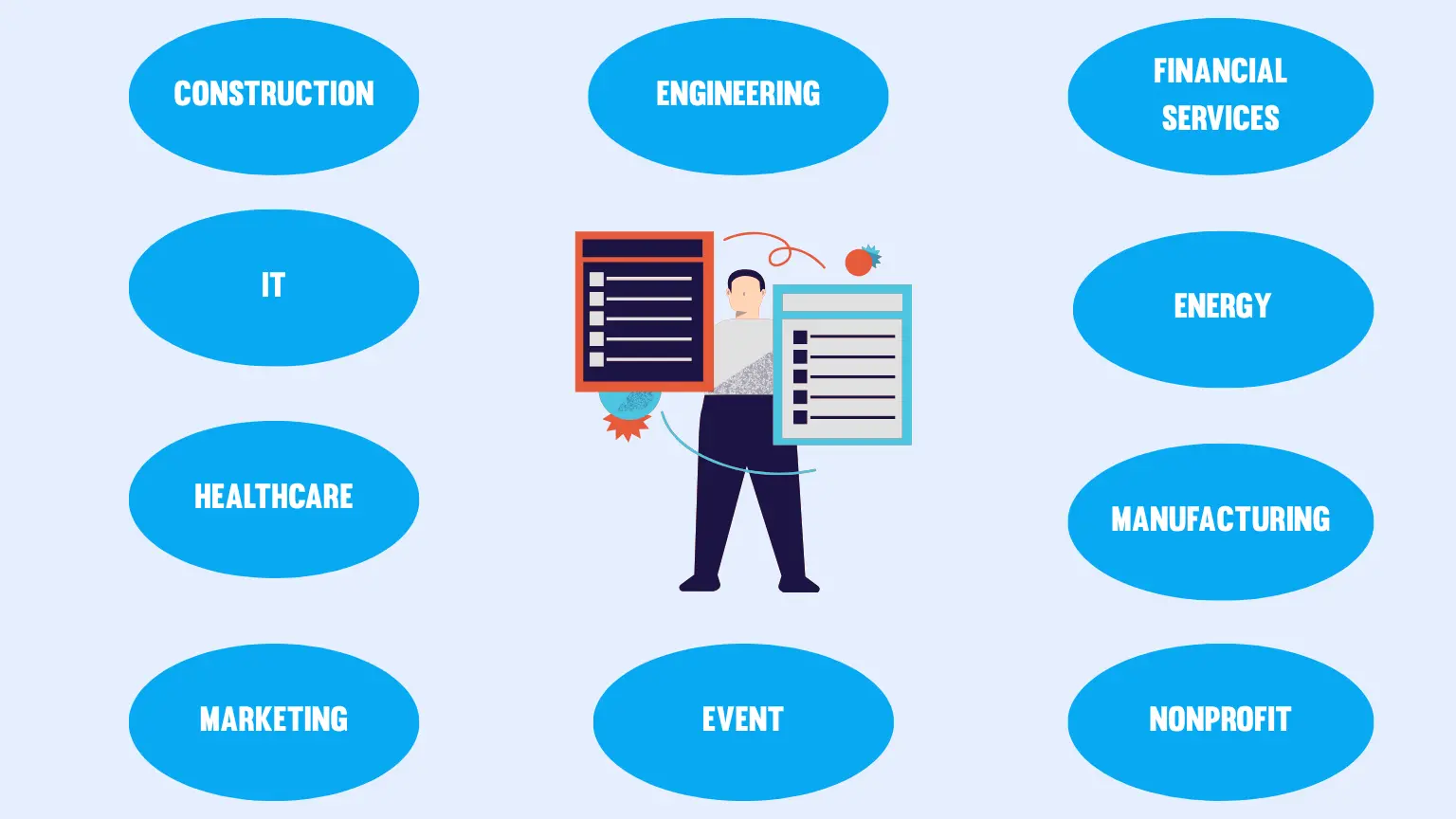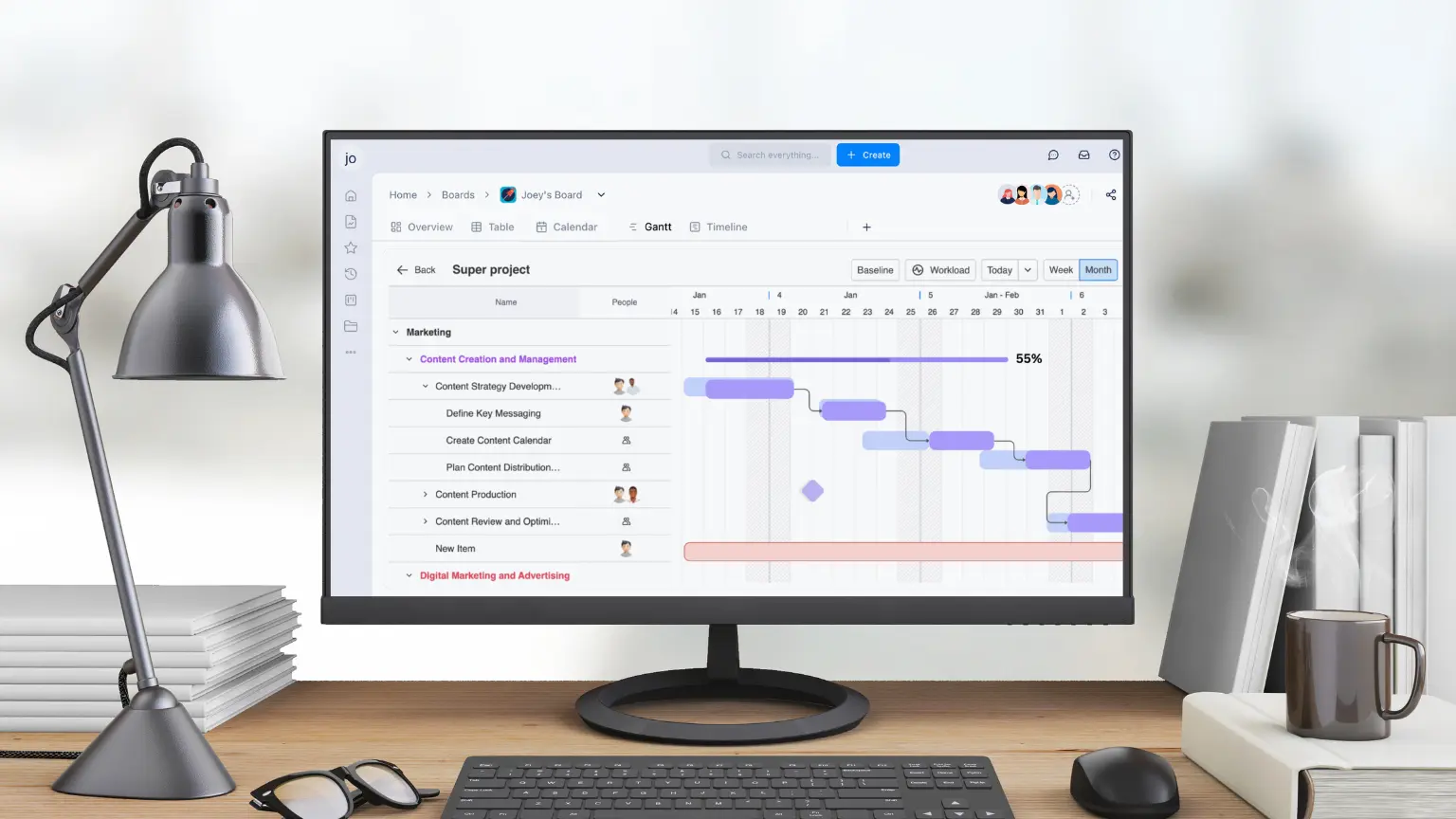Industry-Specific Project Managers: Roles, Skills, and Work Environments
Discover the diverse roles, essential skills, and unique work environments of ten industry-specific project managers, and learn how TaskFord empowers them to excel.
Project management is the engine driving organizational success, transforming ambitious ideas into tangible outcomes through meticulous planning, execution, and oversight. The role of a project manager, however, is far from uniform. It adapts to the unique demands of each industry, from the structured chaos of construction sites to the innovative pace of tech startups, the regulated precision of healthcare, and the creative energy of marketing agencies. Each type of project manager brings specialized expertise, tailored skills, and an intimate understanding of their work environment to deliver results.
This comprehensive blog explores ten distinct types of project managers, detailing their roles, essential skills, and the environments they navigate, while highlighting how TaskFord, a leading project management platform, empowers these professionals to excel. We'll also provide a concise overview of what a project manager does to ground our exploration of their industry-specific contributions.
What Does a Project Manager Do?
A project manager is responsible for guiding a project from concept to completion, ensuring it meets its goals within scope, budget, and timeline. They plan and define objectives, allocate resources, coordinate teams, manage risks, and communicate with stakeholders to deliver results that align with expectations.
For a deeper dive into the role, check out What Does A Project Manager Do?
Exploring Ten Types of Project Managers

Project management takes on unique forms across industries, requiring specialized knowledge and approaches. Below, we examine ten types of project managers, their responsibilities, skills, and work environments.
1. Construction Project Managers
Role and Responsibilities: Construction project managers oversee building projects, from residential homes to infrastructure like bridges or skyscrapers. They coordinate architects, engineers, contractors, and suppliers, ensuring compliance with safety regulations and building codes. Their tasks include securing permits, managing budgets, scheduling tasks, and mitigating risks like material shortages or labor disputes.
Key Skills:
- Technical Expertise: Understanding construction techniques, materials, and structural engineering.
- Risk Management: Addressing issues like weather delays or regulatory hurdles.
- Stakeholder Coordination: Communicating with clients, local authorities, and subcontractors.
- Financial Acumen: Controlling costs for large-scale projects while maintaining quality.
Work Environment: These managers split time between offices and construction sites, navigating dusty, noisy environments to inspect progress and resolve issues. The work is high-pressure, with tight deadlines and significant financial stakes. External factors like weather or labor strikes add unpredictability.
Challenges: Balancing safety, quality, and timelines while managing diverse teams. Unexpected costs, such as rising material prices, or permitting delays can disrupt schedules.
2. IT Project Managers
Role and Responsibilities: IT project managers lead technology initiatives, such as software development, cloud migrations, or cybersecurity upgrades. They bridge technical teams and business stakeholders, ensuring projects align with organizational goals. Their duties include defining scopes, managing development sprints, overseeing testing, and ensuring systems meet user needs.
Key Skills:
- Technical Proficiency: Knowledge of programming languages (e.g., Python, Java), cloud platforms (e.g., AWS), or Agile methodologies like Scrum.
- Problem-Solving: Resolving bugs, integration issues, or scope creep.
- Team Leadership: Coordinating developers, QA testers, and UX designers.
- Change Management: Guiding organizations through technology adoption.
Work Environment: IT project managers work in offices or remotely, collaborating with global teams via digital platforms. They spend time reviewing code, tracking sprints, or analyzing user feedback in fast-paced environments with tight release schedules.
Challenges: Keeping pace with evolving technologies and managing stakeholder expectations. Miscommunication between technical and non-technical teams can lead to misaligned priorities.
3. Healthcare Project Managers
Role and Responsibilities: Healthcare project managers oversee initiatives like hospital expansions, electronic health record (EHR) implementations, or clinical trials. They ensure compliance with regulations like HIPAA while improving patient care. Their tasks include coordinating medical staff, vendors, and administrators, managing budgets, and tracking outcomes.
Key Skills:
- Regulatory Knowledge: Expertise in healthcare laws and data privacy.
- Stakeholder Engagement: Communicating with clinicians and executives.
- Data Analysis: Measuring success through metrics like patient satisfaction.
- Crisis Management: Handling urgent issues impacting patient care.
Work Environment: These managers work in hospitals, clinics, or administrative offices, in highly regulated settings focused on patient safety and data security. They navigate high-stakes environments where delays can affect care delivery.
Challenges: Managing complex regulations and ethical considerations, such as ensuring data security during EHR rollouts. Resistance from medical staff can complicate adoption.
4. Marketing Project Managers
Role and Responsibilities: Marketing project managers orchestrate campaigns, product launches, or brand initiatives. They coordinate creative teams, including designers and digital marketers, to deliver cohesive messaging. Their tasks include planning timelines, managing budgets, and analyzing metrics like ROI or engagement rates.
Key Skills:
- Creative Oversight: Guiding compelling content and visuals.
- Analytics: Interpreting data from Google Analytics or social platforms.
- Collaboration: Aligning creative, technical, and sales teams.
- Market Awareness: Adapting to consumer trends or algorithm changes.
Work Environment: These managers work in vibrant agency or corporate settings, often collaborating remotely with freelancers or attending photoshoots. The environment is dynamic, driven by market demands and tight deadlines.
Challenges: Balancing creativity with measurable results. Rapid shifts in consumer behavior or platform algorithms require quick strategic pivots.
5. Engineering Project Managers
Role and Responsibilities: Engineering project managers lead projects like product development or infrastructure upgrades. They work with engineers, designers, and supply chain teams to bring concepts to life, managing timelines, ensuring quality, and aligning with technical specifications.
Key Skills:
- Technical Knowledge: Understanding disciplines like mechanical or electrical engineering.
- Project Planning: Breaking down complex projects into phases.
- Vendor Management: Coordinating material or component suppliers.
- Quality Assurance: Ensuring products meet standards.
Work Environment: These managers work in offices, labs, or manufacturing facilities, visiting factories or testing sites. The environment demands technical precision and collaborative problem-solving.
Challenges: Managing intricate technical requirements and supply chain disruptions, like delayed components, which can cause costly setbacks.
6. Event Project Managers
Role and Responsibilities: Event project managers plan and execute conferences, trade shows, or corporate retreats. They handle logistics like venue selection, catering, and audiovisual setups, coordinating with vendors, sponsors, and attendees to create memorable experiences.
Key Skills:
- Logistics Planning: Managing budgets, timelines, and vendor contracts.
- Negotiation: Securing favorable terms with suppliers.
- Crisis Management: Handling last-minute issues like speaker cancellations.
- Attendee Engagement: Ensuring events deliver value, like networking opportunities.
Work Environment: These managers work in offices, event venues, or on-site during setup. The environment is high-energy, with long hours and frequent travel.
Challenges: Coordinating multiple moving parts while staying within budget. Last-minute changes, like weather issues for outdoor events, require quick thinking.
7. Energy Project Managers
Role and Responsibilities: Energy project managers oversee renewable energy installations, oil and gas projects, or grid modernizations. They coordinate engineers, regulatory bodies, and contractors, securing permits and managing environmental impact assessments.
Key Skills:
- Technical Expertise: Knowledge of energy systems like solar or wind.
- Regulatory Compliance: Navigating environmental regulations.
- Stakeholder Management: Engaging with communities and investors.
- Sustainability Focus: Incorporating eco-friendly practices.
Work Environment: These managers work in offices, field sites, or remote facilities like offshore wind farms. The environment blends technical complexity with environmental considerations.
Challenges: Balancing cost, efficiency, and environmental impact. Community opposition or fluctuating commodity prices can complicate projects.
8. Financial Services Project Managers
Role and Responsibilities: Financial services project managers lead system upgrades, compliance audits, or product launches like mobile banking apps. They ensure alignment with financial regulations, coordinating IT teams, compliance officers, and executives.
Key Skills:
- Regulatory Knowledge: Understanding laws like Dodd-Frank .
- Data Security: Protecting sensitive financial data.
- Stakeholder Communication: Translating technical details for regulators.
- Risk Analysis: Assessing risks like system downtimes.
Work Environment: These managers work in corporate offices or remotely, in high-security environments due to sensitive data. The pace emphasizes precision and compliance.
Challenges: Navigating regulations and ensuring zero downtime during upgrades. Stakeholder pressure for rapid delivery can conflict with compliance needs.
9. Manufacturing Project Managers
Role and Responsibilities: Manufacturing project managers oversee factory expansions, equipment upgrades, or production optimizations. They coordinate engineers, supply chain teams, and production staff to improve efficiency and output.
Key Skills:
- Process Optimization: Using lean methodologies to boost efficiency.
- Supply Chain Management: Ensuring timely material deliveries.
- Team Leadership: Managing factory workers and technicians.
- Quality Control: Ensuring products meet standards.
Work Environment: These managers work in offices or on factory floors, in noisy, industrial settings. They may oversee night shifts or visit suppliers.
Challenges: Minimizing downtime during upgrades and managing supply chain volatility, like global chip shortages.
10. Nonprofit Project Managers
Role and Responsibilities: Nonprofit project managers lead fundraising campaigns, community programs, or grant-funded initiatives. They coordinate volunteers, donors, and partners to achieve mission-driven goals, managing budgets and reporting impact.
Key Skills:
- Grant Management: Writing proposals and tracking progress.
- Community Engagement: Building relationships with stakeholders.
- Resourcefulness: Achieving goals with limited budgets.
- Impact Measurement: Demonstrating program success to funders.
Work Environment: These managers work in offices, community centers, or field locations, often with limited resources. The environment is mission-driven, focused on social impact.
Challenges: Stretching limited budgets and managing volunteer teams. Securing consistent funding in competitive grant cycles is a hurdle.
Universal Project Management Skills
Across industries, project managers share core competencies:
- Leadership: Inspiring teams to achieve objectives.
- Communication: Bridging technical and non-technical stakeholders.
- Time Management: Prioritizing tasks under pressure.
- Risk Assessment: Mitigating potential issues.
- Adaptability: Adjusting to changes like regulatory shifts or market trends.
These skills, paired with industry expertise, make project managers indispensable.
How TaskFord Empowers Industry-Specific Project Managers

TaskFord is a versatile platform tailored to the needs of project managers across industries. Its customizable features and integrations enhance efficiency and collaboration. Here's how TaskFord supports each type:
- Construction: Scheduling tools track milestones and resources, while document management centralizes permits and blueprints, ensuring compliance and efficient coordination.
- IT: Supports Agile and Waterfall methodologies with task prioritization and sprint tracking features, enabling effective management of software development or system upgrades.
- Healthcare: Compliance tracking ensures adherence to regulations like HIPAA, and secure data storage protects patient information during EHR implementations or facility expansions.
- Marketing: Visual dashboards monitor campaign metrics like engagement rates, and collaboration tools centralize feedback, reducing revision cycles for creative projects.
- Engineering: Resource allocation optimizes equipment and personnel usage, with Gantt charts providing clear timelines for product development or infrastructure projects.
- Event: Timeline and budget tools simplify logistics planning, with real-time updates to handle last-minute changes like vendor cancellations.
- Energy: Regulatory tracking aligns projects with environmental standards, and sustainability metrics support eco-friendly initiatives like renewable energy installations.
- Financial Services: Secure data management and compliance tracking ensure regulatory adherence during system upgrades or compliance audits.
- Manufacturing: Production tracking minimizes downtime, and supply chain tools ensure timely material deliveries for factory expansions or process optimizations.
- Nonprofit: Budget tools maximize limited resources, and impact tracking supports grant reporting, enhancing donor engagement and program success.
Overcoming Industry-Specific Obstacles
Each industry presents distinct hurdles that project managers must address with precision and adaptability. These challenges test their ability to anticipate issues, pivot strategies, and maintain progress under pressure. Below are the key obstacles faced by each type of project manager and how they navigate them:
- Construction: Unpredictable weather, labor shortages, or delays in securing permits can halt progress. Managers use contingency plans, such as backup suppliers or flexible scheduling, to keep projects on track.
- IT: Rapidly evolving technologies and misaligned stakeholder expectations demand constant learning and clear communication. Managers leverage Agile methodologies and regular status updates to align teams and adapt to new tools.
- Healthcare: Stringent regulations and resistance to change from medical staff require careful compliance management and stakeholder engagement. Managers conduct training sessions and use compliance-focused tools to ensure smooth adoption.
- Marketing: Shifts in consumer preferences or social media algorithms necessitate quick pivots. Managers monitor real-time analytics and maintain flexible campaign plans to adapt to market changes.
- Engineering: Supply chain disruptions or design flaws can derail timelines. Managers build strong vendor relationships and use iterative testing to catch issues early.
- Event: Last-minute cancellations or budget overruns require rapid problem-solving. Managers maintain backup plans, like reserve vendors, and negotiate cost-effective contracts to stay within budget.
- Energy: Environmental regulations and community pushback complicate projects. Managers engage stakeholders early and use sustainability-focused planning to align with regulatory and social expectations.
- Financial Services: Data security risks and regulatory compliance demand meticulous oversight. Managers implement robust cybersecurity protocols and regular audits to ensure compliance and protect sensitive information.
- Manufacturing: Production downtime or material shortages can disrupt output. Managers use lean methodologies and real-time supply chain tracking to minimize interruptions.
- Nonprofit: Limited budgets and volunteer coordination challenges require resourcefulness. Managers prioritize high-impact tasks and use donor engagement strategies to secure funding.
TaskFord's adaptable features help managers overcome these hurdles.
The Future of Project Management in These Areas
The landscape of project management is evolving, driven by advancements that enhance efficiency and adaptability across industries. Key trends are shaping how project managers operate:
- Automation: Automated task scheduling and resource allocation tools are transforming project execution. In Construction, automation optimizes scheduling to reduce downtime. In manufacturing, automated production tracking minimizes delays, ensuring consistent output.
- Sustainability: Growing emphasis on eco-friendly practices is reshaping project priorities. Construction managers incorporate green building materials, while energy managers focus on renewable systems like solar or wind to meet environmental standards.
- Remote Collaboration: Distributed teams are increasingly common in marketing and IT. Project management platforms enable real-time collaboration, allowing managers to coordinate global teams and maintain alignment across time zones.
- Data-Driven Decisions: Analytics tools provide deeper insights into project performance. Marketing managers use engagement data to refine campaigns, and healthcare managers track patient outcomes to assess project impact.
TaskFord equips project managers with robust tools, such as automated scheduling and data dashboards, to stay ahead of these trends, ensuring they can adapt to evolving industry demands.
Conclusion
Project managers are the linchpin of successful projects, adapting their skills to the unique demands of their industries. From construction to nonprofits, they navigate complex challenges to deliver results. TaskFord empowers these professionals with tailored solutions, from scheduling to compliance tracking. Explore TaskFord to elevate your project management and achieve success.
Learn more
- Project Management Guide in 2025
- A Day in the Life of a Project Manager: How They Bring Projects to Life
- 80 Key Project Management Terms You Should Know
Making work simpler,
smarter, and more connected
Join our waitlist and be notified first.

Related Blog
Subscribe for Expert Tips
Unlock expert insights and stay ahead with TaskFord. Sign up now to receive valuable tips, strategies, and updates directly in your inbox.

![7 Must-Have Project Management Documents Every PO Should Know [Free Templates]](https://taskford.com/marketing/blog/project-management-documents.webp)




